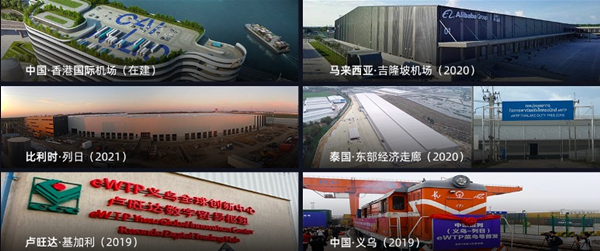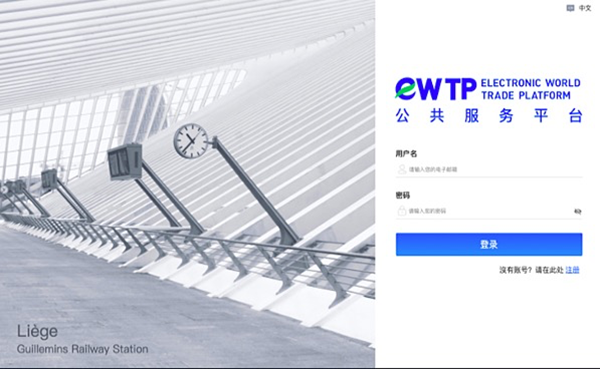
- Home
- Media Center
-
Events
- Wuzhen Summit
- Regional Forums
- Practice Cases of Jointly Building a Community with a Shared Future in Cyberspace
- World Internet Conference Awards for Pioneering Science and Technology
- The Light of Internet Expo
- Straight to Wuzhen Competition
- Global Youth Leadership Program
- WIC Distinguished Contribution Award
- Membership
- Research & Cooperation
- Digital Academy
-
Reports
- Collection of cases on Jointly Building a Community with a Shared Future in Cyberspace
- Collection of Shortlisted Achievements of World Internet Conference Awards for Pioneering Science and Technology
- Reports on Artificial Intelligence
- Reports on Cross—Border E—Commerce
- Reports on Data
- Outcomes of Think Tank Cooperation Program
- Series on Sovereignty in Cyberspace Theory and Practice
- Other Achievements
- About WIC
- 中文 | EN

EWTP practices promote inclusive trade
In 2016, Alibaba Group initiated the electronic World Trade Platform (eWTP) , which later was included in the Hangzhou G20 Summit Communiqué. eWTP aims to advocate global public-private cooperation, leverage China's experience and advantages in the field of digital economy, and works with domestic and foreign partners to jointly promote the creation of four networks of digital economy infrastructure — global transaction, logistics, payment finance and public service platform networks, and explore new rules of digital trade through business practices, and promote the inclusive, green and sustainable development of trade through digital technology.
With the support of relevant governments, eWTP has launched 9 cooperative pilots (Malaysia, Rwanda, Belgium, Thailand, Ethiopia, China Hangzhou, Yiwu, Hainan, Hong Kong) to help advance the digital economy Development and transformation.
Promote digital e-commerce to serve SMEs to participate in global trade
Under the new development pattern of "dual circulation" promoting the domestic and international economic cycle, eWTP promotes SMEs to participate in global trade in the following two ways. The first appraoch is to cooperate with Alibaba e-commerce platforms to help pilot countries and regions expand exports. Since the launch of the first pilot in 2017, the total export GMV to China from the five overseas pilot countries have all achieved significant growth as of today. The second is to actively help Chinese companies develop overseas markets. Through the Alibaba e-commerce platform, the export of small and medium-sized enterprises to the pilot countries has also increased significantly for 4 consecutive years.
At the same time, with the support of various governments, eWTP also introduced the highest quality specialty products, such as Malaysian Musang King durian, African coffee and pepper, which was recognized as one of the hottest peppers in the world, into China for the first time. During the Davos Forum in 2019, the Rwanda representative shared a $4 coffee story — with the support of eWTP, Rwanda coffee is able to directly reached the Chinese consumers directly through internet. For every kilogram of coffee sold by farmers to China, their income increases by $4, while Chinese consumers also pay $4 less by reducing intermediate links.

Malaysia Week jointly held by Alibaba Group and Malaysia's government (2019)

Zhu Lin, deputy Prime Minister and minister of commerce of Thailand, shares Thai featured products through Taobao live streaming (2020)
Establishing digital logistics network to improve efficiency of cross-border logistics services
In order to solve the problems of transportation difficulties and high costs, eWTP has built a digital logistics network around the world to provide intensive services for small and medium-sized enterprises. eWTP has set up regional logistics hubs in Malaysia, Belgium, etc. In addition, eWTP also cooperated with partners to launch eWTP Yixin Europe Express to link ehubs in Yiwu and Liege, and launched Hangzhou-Malaysia and Hangzhou-Belgium international freight routes to improve the efficiency of logistics services in cross-border trade.
When the new covid-19 broke out in 2020, most global ports were closed and flights were suspended. The eWTP logistics hub still maintained efficient operation and became a life channel to contribute to the global fight against the pandemic. In the first three months after the outbreak, a total of more than 100 million medical supplies were quickly delivered to more than 80 countries and regions in Asia, Africa and Europe through eWTP hubs in Belgium, Malaysia, and Ethiopia. The eWTP Belgium hub was also listed as one of the eight hubs of the global humanitarian emergency network newly established by the World Health Organization and the World Food Program.

Ehubs and freight train in eWTP logistics network
Build digital financial network to facilitate cross-border payment and settlement
Nine overseas e-wallets have been successively launched in Malaysia, Thailand,etc, to help local businesses and consumers realize digital payments. For example, the local e-wallet TnGD launched in Malaysia and local partners can support multi-scenario applications such as road tolling, offline retail, transfer, and recharge, and has provided payment financial services for more than 5 million Malaysian users.

Local e-wallet brought conveniency for consumers in Malaysia and Thailand
Form a digital public service platform to provide digital solutions
Relying on overseas bonded parks and logistics hubs, we have launched eWTP public service platform (PSP) in Belgium, Malaysia and Thailand successively, to provide merchants with one-stop digital solutions for logistics, finance, customs, taxation, and remittance.
For example, through technology and experience, together with Cainiao and other e-commerce partners, eWTP worked closely with Malaysia's government to help launch digital customs clearance solutions, optimize the operation process from aircraft landing to cargo release. The digital solution eventually helped reduce the time of average custom clearance from 24-48 hours offline to 0-3 hours online. Among them, 99% of online packages can achieve customs clearance in seconds.

EWTP Public Service Platform (PSP) - Belgium
In addition, eWTP also provides diversified training by sharing China's digital economy experience to support partner countries on digital economy human resource development. Through internet and digital capabilities, eWTP will continue to work with more and more partners to promote the construction of global digital economy infrastructure and inclusive development, in order to jointly build a community of shared future in cyberspace.

The World Internet Conference (WIC) was established as an international organization on July 12, 2022, headquartered in Beijing, China. It was jointly initiated by Global System for Mobile Communication Association (GSMA), National Computer Network Emergency Response Technical Team/Coordination Center of China (CNCERT), China Internet Network Information Center (CNNIC), Alibaba Group, Tencent, and Zhijiang Lab.





